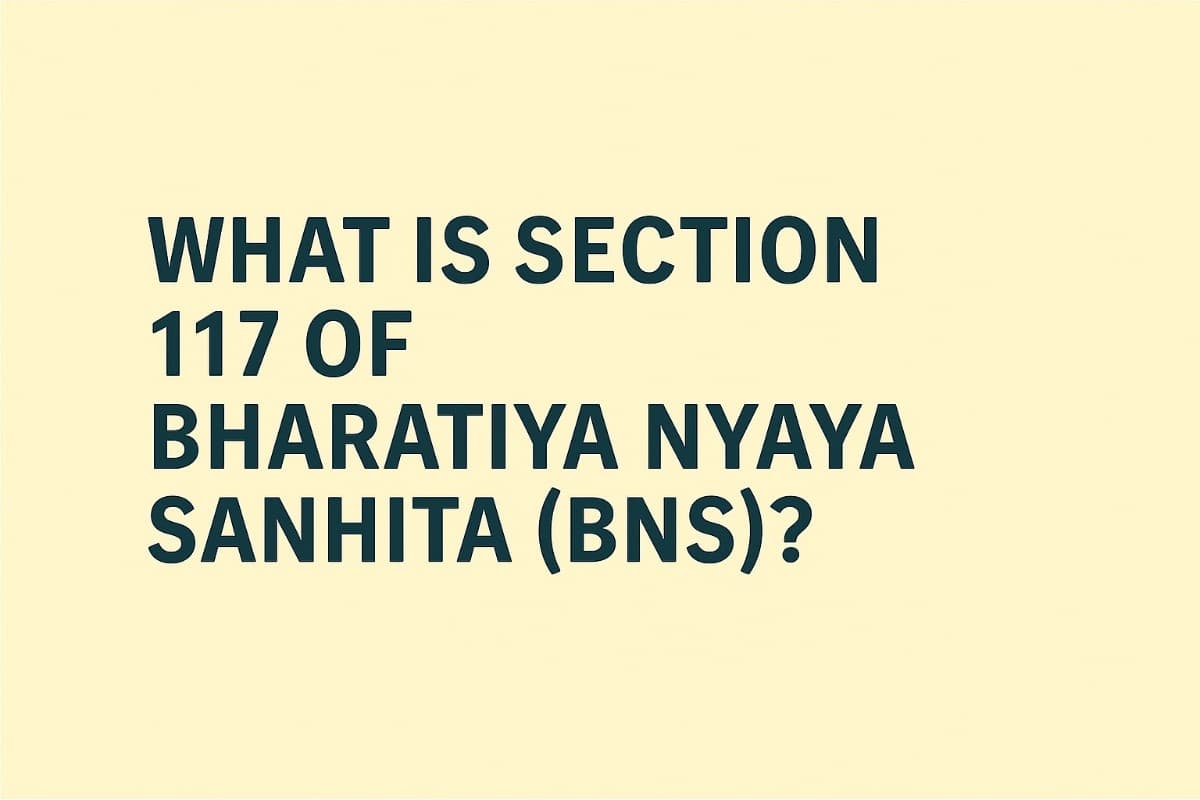What is Section 117 of Bharatiya Nyaya Sanhita (BNS)?

Section 117 of Bharatiya Nyaya Sanhita (BNS) is a substantial provision that targets the offence of "voluntarily causing grievous hurt," a key aspect of India's reformed criminal law landscape. Section 117 BNS criminalizes situations where an individual, with intent or knowledge, causes severe bodily harm to another person. The section is drafted to reflect modern sensitivities and address dangerous, discriminatory, or group-based assaults that result in serious injury, moving beyond the language of the erstwhile IPC and integrating deeper judicial clarity.
What Does Section 117 of Bharatiya Nyaya Sanhita Cover?
Section 117 BNS penalizes anyone who intentionally causes or knows their actions are likely to cause grievous hurt, and actually causes such hurt. The law requires BOTH: (a) an act resulting in grievous hurt, and (b) intention or knowledge that such grievous hurt would likely occur. Even if a different category of grievous injury occurs from what was intended, liability under Section 117 remains.
"Grievous hurt" under BNS encompasses injuries such as permanent disfigurement, loss of sight or limb, fracture, or pain leaving the victim debilitated for 15 days or more. Typical examples include broken bones, permanent loss of function like blindness or paralysis, or enduring pain after assault.
Punishments Under Section 117 BNS
Basic Offence: For ordinary cases of voluntarily causing grievous hurt, imprisonment can extend up to seven years, along with a fine. This applies where severe physical injury is intended or foreseen, and such injury actually results.
Severe Cases (Permanent Disability or Vegetative State): If the harm causes permanent disability or leaves the victim in a vegetative state, punishment increases drastically with minimum rigorous imprisonment of 10 years, which may extend to life imprisonment, and fines. These cases are tried by courts of session and are classified as non-bailable offences, making bail difficult to secure.
Group Offences (Discrimination-based): If five or more persons cause grievous hurt based on discrimination by race, caste, religion, gender, etc., each is held liable, facing up to seven years' imprisonment and a fine. Such cases are handled by higher courts and are usually non-bailable.
Bailable vs Non-Bailable Classification
Bailable: Ordinary less severe cases under Section 117 BNS are bailable, meaning the accused can apply for and often secure release until and during trial.
Non-Bailable: Offences involving permanent disability, vegetative state, or group-based violence under Section 117 are classified as non-bailable, requiring court discretion for bail.
Legal Process and Defences
Section 117 BNS is a cognizable offence, so the police may arrest without a warrant and initiate immediate investigation. The prosecution must prove both the grievous nature of the injury and the accused's knowledge or intent. Defences may succeed if the injury was accidental, not grievous, or lacked intent/knowledge.
If you are accused or a victim under Section 117 of Bharatiya Nyaya Sanhita, prompt legal advice is vital. For robust defence, bail, or victim representation, contact the experienced team at Vakeel Saab. The experts at Vakeel Saab understand every nuance of BNS provisions, group offences, and aggravated punishment scenarios. For urgent legal support, call +91 72848 72848 or visit www.vakeelsaab.com.
Frequently Asked Questions
Q1: What is considered "grievous hurt" under Section 117 BNS? Serious physical injuries like permanent disability, fracture, loss of sight, or injury causing long-term pain/debilitation qualify.
Q2: What are the punishments under Section 117 BNS? Punishments range from up to 7 years' jail plus a fine for basic offences, to 10 years to life for permanent disability or vegetative state, and up to 7 years for group discrimination offences.
Q3: Is Section 117 BNS bailable? Basic cases may be bailable, but serious cases like permanent disability or group violence are non-bailable.
Q4: Does group-based violence increase punishment under Section 117 BNS? Yes, violence by a group of 5+ persons, especially on discrimination grounds, invites harsher, non-bailable sentences.
Q5: Can bail be obtained in a Section 117 BNS case? Only for less severe cases; serious offences require session court intervention and strict scrutiny.
Q6: Is intent always required for Section 117 BNS? Yes, either intent or knowledge is essential. Without it, liability may only arise under lesser provisions like negligence.
Q7: Where are Section 117 BNS cases tried? Ordinary cases: any magistrate's court; severe cases: court of session.
Q8: Is medical evidence important in Section 117 BNS cases? Absolutely—it's central to proving the grievous nature of injuries.
Q9: Can a person be punished if the injury is different from what was intended? Yes, as long as the injury is grievous and the intent/knowledge relates to causing grievous hurt even of a different kind.
Q10: Where can I get the best legal assistance for Section 117 BNS? Contact Vakeel Saab at +91 72848 72848 or visit www.vakeelsaab.com for specialized defence and prosecution in Section 117 BNS cases.
Tags:Section 117 Bharatiya Nyaya Sanhita, Section 117 BNS, Section 117 grievous hurt, Section 117 BNS punishment, Section 117 legal process, Section 117 non-bailable, Section 117 bailable, group violence Section 117, Section 117 disability, Section 117 BNS lawyer, Section 117 criminal intimidation, Section 117 medical evidence, Vakeel Saab Section 117, Section 117 BNS FAQs, best criminal lawyer Section 117, BNS offence grievous hurt India
Related Articles
The Importance of Consulting a Property Lawyer for Real Estate Issues
Blog
How to File a POCSO Complaint in India: Step-by-Step Legal Process
Blog
What punishments does the law give for giving, taking, or asking for dowry?
Blog
Reasons for the Increasing Divorce Rates in India
Blog
What is a Special Leave Petition? Meaning, Features, Process & & Who Can File?
Blog
What Is the Difference Between Mutual Divorce and Contested Divorce?
Blog